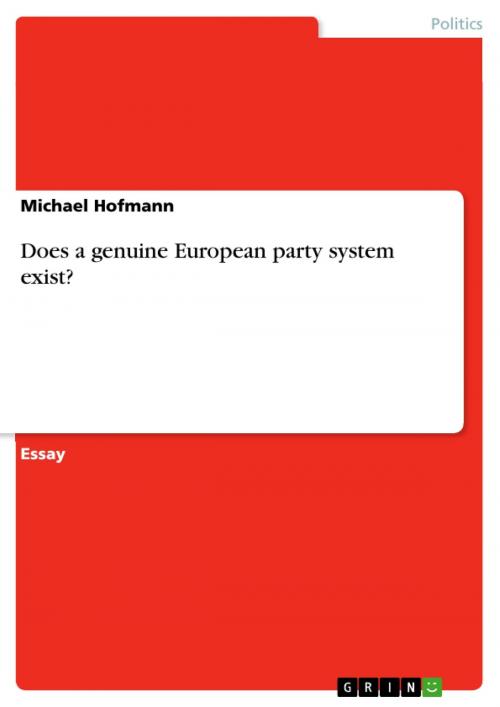Does a genuine European party system exist?
Nonfiction, Social & Cultural Studies, Political Science, International, Foreign Legal Systems| Author: | Michael Hofmann | ISBN: | 9783638817240 |
| Publisher: | GRIN Publishing | Publication: | June 23, 2007 |
| Imprint: | GRIN Publishing | Language: | English |
| Author: | Michael Hofmann |
| ISBN: | 9783638817240 |
| Publisher: | GRIN Publishing |
| Publication: | June 23, 2007 |
| Imprint: | GRIN Publishing |
| Language: | English |
Essay from the year 2004 in the subject Politics - Political Systems - General and Comparisons, grade: 9 (out of 10), Vilnius University, 17 entries in the bibliography, language: English, abstract: Political Parties play a crucial role in modern democracies as they form and articulate the political will of the citizens of a nation and represent their interests. This significance is also acknowledged within the European Union where they exert already a great influence in all European institutions. The European Council, the Council of Ministers as well as the Commission are mainly constituted of 'senior party figures'. 'All political parties that are members of a national governing coalition are automatically sucked into the management of the Union.' However, political parties do not dispose of the same resources and support than they do at national level. This is, for instance, sensible looking at the very low turnout rates in elections for European Parliament and opinion polls reflecting little identification with European parties. National party elites often neglect or avoid European issues during the campaigns in favour of domestic issues. But since the process of European Integration and Enlargement is proceeding, there arises the need to enhance a genuine European party system. It is widely acknowledged among European politicians that the institutional, legal and also actual power of European political parties did not keep pace with this development and need to be extended, as they are 'intermediators between society and government' and even 'political entrepreneurs of effective liberal democratic systems'. This paper deals with the question, whether a genuine European party system exists, or respectively why it does not exist (already). Such a party system comprises Euro-parties, party groups in the EP, their coalitions and national delegations within the groups. To cover all the aspect would, however, go beyond the scope of this paper. Therefore, focus is put on the Euro-parties. First, the notion of party systems in general will be explored and then the legal framework of Euro-parties against the background of the reform process of the European Parliament pointed out. Further on, I will analyse the existing party families and Euro-parties. The working paper delivered by Stoiber will be of help in this respect. In a following chapter, the impact of European integration in regard to national parties and citizens is going to be set out. Finally, I shall draw a conclusion and eventually give an outlook for a future European party system.
Essay from the year 2004 in the subject Politics - Political Systems - General and Comparisons, grade: 9 (out of 10), Vilnius University, 17 entries in the bibliography, language: English, abstract: Political Parties play a crucial role in modern democracies as they form and articulate the political will of the citizens of a nation and represent their interests. This significance is also acknowledged within the European Union where they exert already a great influence in all European institutions. The European Council, the Council of Ministers as well as the Commission are mainly constituted of 'senior party figures'. 'All political parties that are members of a national governing coalition are automatically sucked into the management of the Union.' However, political parties do not dispose of the same resources and support than they do at national level. This is, for instance, sensible looking at the very low turnout rates in elections for European Parliament and opinion polls reflecting little identification with European parties. National party elites often neglect or avoid European issues during the campaigns in favour of domestic issues. But since the process of European Integration and Enlargement is proceeding, there arises the need to enhance a genuine European party system. It is widely acknowledged among European politicians that the institutional, legal and also actual power of European political parties did not keep pace with this development and need to be extended, as they are 'intermediators between society and government' and even 'political entrepreneurs of effective liberal democratic systems'. This paper deals with the question, whether a genuine European party system exists, or respectively why it does not exist (already). Such a party system comprises Euro-parties, party groups in the EP, their coalitions and national delegations within the groups. To cover all the aspect would, however, go beyond the scope of this paper. Therefore, focus is put on the Euro-parties. First, the notion of party systems in general will be explored and then the legal framework of Euro-parties against the background of the reform process of the European Parliament pointed out. Further on, I will analyse the existing party families and Euro-parties. The working paper delivered by Stoiber will be of help in this respect. In a following chapter, the impact of European integration in regard to national parties and citizens is going to be set out. Finally, I shall draw a conclusion and eventually give an outlook for a future European party system.















